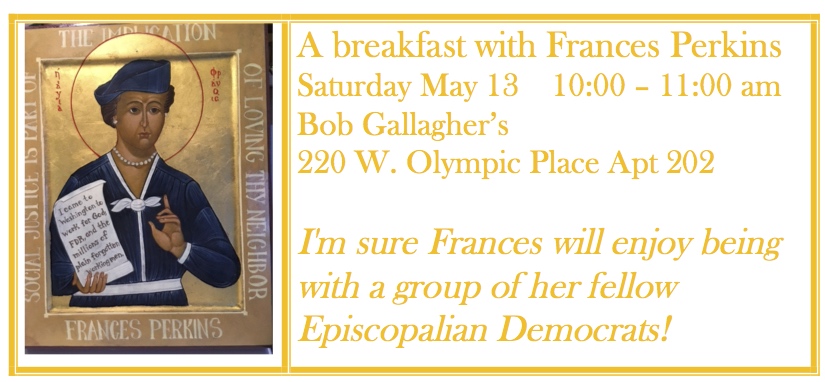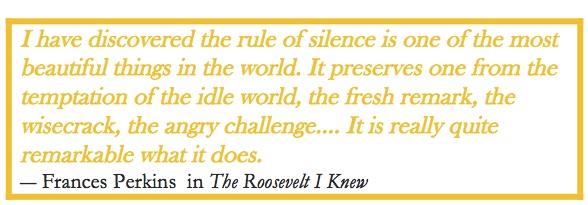Breakfast with Frances Perkins
 Friday, May 12, 2017 at 9:10AM
Friday, May 12, 2017 at 9:10AM  Tomorrow is the Feast of Blessed Frances Perkins. We’re having breakfast.
Tomorrow is the Feast of Blessed Frances Perkins. We’re having breakfast.
I’m joining a few friends for the 9:00 am Eucharist. Afterward we’ll gather at my apartment for breakfast. It’s all a celebration of Frances Perkins.
A time for unity
I’ve spent some energy since the election encouraging clergy to contain the impulse toward self-righteousness. Further dividing our parishes isn’t a faithful pathway. Being so right that we’re wrong isn’t faithfulness. Friends tell me of sermons intended to make the Trump voter in the parish so upset that she leaves the building. Even more frequent are the sermons that sound like a Bernie pep rally. Admonishing parishioners to love and not hate is certainly of the Gospel. However, in many of our parishes the temptation to hate is directed at people we disagree with politically. Where are the sermons to help us love our enemies?
As part of my Lenten discipline:
I decided that I need to direct my attention, my self-control and “imaginative sympathy,” toward those I most disagree with.
I decided I needed to open myself to other ways of seeing and understanding.
I needed to be curious about what truth is carried by those I fear.
My Lenten discipline has been to get out of my own bubble. It included reading material to engage conservative thought with “imaginative sympathy.”
I've been reading thinkers who come at faith and politics in a way that differs from my own place of comfort -- some conservative Episcopalians and Anglicans -- specifically Michael Gerson's "City of Man: Religion and Politics in a New Era" and John Danforth "Faith and Politics" and "The Relevance of Religion." I've also read Ken Woodward's "Getting Religion: Faith, Culture and Politics from the Age of Eisenhower to the Era of Obama" as a way of reminding myself of the shifts this society has been through. I have also put on my phone connections to The Federalist, National Review, and First Things.
I’ve also been encouraging our largely liberal clergy to channel Vida Scudder. She gave an address in 1918 when the United States was at war and torn internally by fear of traitors and immigrants. It’s the time when what we had called “frankfurters” became “hot dogs.” There’s the Red Scare and the Spanish Flu. We didn’t trust each other. We feared each other.
In her book based on that address she offered a reflection on All Saints Eve and the communion of saints. She said this --
Mechanical and automatic subjection to authority is bad, whether in state or Church; but voluntary self-control, born of imaginative sympathy, is the first qualification for democracy. A loving obedience to the will of Mother Church as she calls her children to follow the successive phases of her dramatic sequence, can furnish powerful aid in forming the interior habits which must be the strength of a socialized civilization. Our national life needs nothing so much as a sense of unity Vida Dutton Scudder, Regarding the Church Year -All Saints Eve
voluntary self-control, born of imaginative sympathy, is the first qualification for democracy
Our national life needs nothing so much as a sense of unity
From time to time
From time to time it’s good to celebrate our own way of putting together the faith and politics. In my own bringing together of these things I find myself convinced that responsible social policy and political action calls for attention to things like protecting and expanding the safety net, generosity toward those fleeing oppression and violence in other lands, and an emphasis on “justice for all."
If I were a parish priest with a mix of conservatives and liberals I’d probably identify a politically conservative saint and help organize a breakfast on that day, for that community.
But tomorrow – I’m with Francis Perkins. I get to celebrate my own political tribe.
Frances Perkins: had a vision
In February 1933, Frances Perkins met with Franklin Roosevelt in New York City. He had been elected President and he wanted her to be his Secretary of Labor. She arrived with her hopes written on a piece of paper.
She wanted the job and she wanted to do it her way. She told FDR what she wanted to do. The list included Social Security, health insurance, a forty-hour workweek, a ban on child labor, a minimum wage, and unemployment compensation.
At an early age Frances Perkins had developed a strong sense of social justice along with a capacity for courage and perseverance. On her graduation from Mount Holyoke in 1902 she was class president. At the final prayer meeting she selected a reading from Saint Paul. “Therefore my beloved breathen, be ye stedfast, unmoveable, always abounding in the work of the Lord ..” The class made “Be Ye Stedfast” their motto.
She was a witness to the Triangle Shirtwaist Fire in 1911. She saw young immigrant women jumping to their deaths to escape the fire. There were 146 dead. That event shifted her from the assumption that her life was to include forms of volunteer social work to having a life-long vocation. In time it brought her, and her vision, to the Cabinet of the United States. Years later she wrote, “The New Deal began on March 25th, 1911. The day that the Triangle factory burned.”
 Frances Perkins: pragmatic faithfulness
Frances Perkins: pragmatic faithfulness
In 1905 she became an Episcopalian. Kirstin Downey, her biographer, wrote:
“She sought a more structured religion with a more formal ceremony… She reveled in its elaborate and archaic rituals. They helped her remain serene and centered at times of stress. The church’s teaching also gave her substantive guidance about the right path to take when confronted with decisions, and the hopeful message of Christianity helped her retain her optimism. Her devotion waxed and waned over the years, but nonetheless served as a bedrock and a way to seek meaning in life when so much seemed inexplicable. These religious leanings became progressively more pronounced over time.” (The Woman Behind the New Deal: The Life of Frances Perkins, FDR'S Secretary of Labor and His Moral Conscience)
Also over time Frances found her early idealism being reshaped with a new pragmatism. She came to understand that to produce significant change she needed allies among politicians. Frances learned to work with Tammany Hall.
A few months after the Triangle fire she was working on a New York State bill to achieve a 54 hour workweek. At one point in that process she was faced with making a decision about whether to maintain her group’s position that the 50,000 women working in the canneries be included, in which case the bill was going to fail; or to accept what was possible which was to include the 400,000 women working in manufacturing.
Kirstin Downey wrote, “Frances, however, was becoming increasingly practical. … Her ability to accept human foibles, to see both failings and strengths, was becoming a core personality trait, bolstering her effectiveness. She found that making deals with imperfect people and focusing on their strengths provided a pathway to actually achieving social change.”
Breakfast with Frances Perkins
I had an icon written by Suzanne Schleck last year. In a recent exchange I told her that I was going to ask a few people to join me for breakfast on Frances' feast day. Suzanne's response was, "I'm sure Frances will enjoy being with a group of her fellow Episcopalian Democrats."
I'm glad it’s Easter and that Lent came to an end; I have gained a bit more respect for people I disagree with; and I long for a moment in which to celebrate my own preferred way of connecting faith and politics. So, here's to Frances Perkins.
rag+